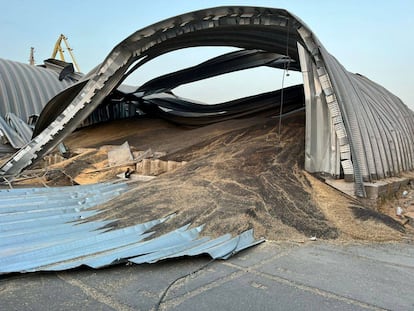Romania, the silent ally avoiding entanglement in Ukraine’s war
Bucharest is analyzing the wreckage of a possibly Russian drone on its territory, while maintaining a cautious approach towards Moscow following recent incidents near its border


The Ukrainian side of the Danube is pierced by the wail of anti-aircraft sirens, a crackling in the night sky and exploding fireballs. A deadly battle has broken out a few yards from the border with Romania. Since the breakdown of an agreement that allowed Ukraine to export grain across the Black Sea, the Russian army has intensified bombings of grain silos in the Ukrainian ports of Izmail and Reni, near the border with Romania, a NATO member country.
On September 4, the Ukrainian Foreign Ministry reported it had a photo of an Iranian-made Shahed drone that exploded over Romanian territory. The Romanian Ministry of Defense swiftly issued a denial, the second time this year that Bucharest has officially refuted a statement from Kyiv. Ukraine’s insistence irritated Romanian leaders, who want to avoid being pulled into a propaganda war. “There have been verified attacks recorded just 800 meters from our border, meaning they were very close,” declared Romanian President Klaus Iohannis on September 5 during a visit to a Romanian military base. “No pieces, drones or components from any other device have penetrated our borders — we have complete control over our airspace,” said Iohannis, who nevertheless expressed concern over bombings so close to the Romanian border.
However, Iohannis took a firmer stance a day later after Defense Minister Angel Tilva confirmed to Romanian TV network Antena 3 that possible drone components were found in the border area following a Russian attack. A large area was cordoned off, although no one was evacuated since the wreckage was not considered dangerous. Tilva said the pieces were being analyzed to identify their origin, and Iohannis requested an immediate investigation. “If elements are confirmed to be from a Russian drone, it would be completely unacceptable and a serious violation of Romania’s sovereignty and territorial integrity as a NATO ally,” said the president, who reiterated that the country is on high alert.
Armand Gosu, an expert on the former Soviet Union, believes it’s entirely possible that a Russian drone could stray into Romanian airspace and may have already done so, which would trigger a NATO response. “The danger,” says the former BBC correspondent in Moscow, “is that Russia will continue to test its limits.”
NATO Article 4
If an attack were to occur on Romanian soil, the country’s army is prepared to respond accordingly, says the Ministry of Defense. Bucharest is ready to deal with any Russian drone or missile that strays into Romania, but is also wary of escalating tensions. Romania can also invoke Article 4 of the NATO Treaty, which calls for joint consultations among member states to safeguard political independence and territorial integrity and security.
Romania’s eastern flank has become crucial for Ukraine, since the region has become a bottleneck for exports of Ukrainian crops like corn, rapeseed and millet, as well as inbound shipments of military equipment and supplies. In August, Romanian Prime Minister Marcel Ciolacu announced his plan to boost the transportation of Ukraine’s grain through Romania to 60%, following a meeting with Ukrainian Prime Minister Denis Shmyhal. To accomplish this goal, Ciolacu has announced plans to double the capacity of the Constanta port on the Black Sea and enhance other routes. These improvements will enable the handling of four million tons per month. “Investments are being made in the Sulina Canal,” said the Romanian Prime Minister, referring to Romania’s main waterway that runs through the Danube Delta.
“Bucharest has made enormous efforts to facilitate the export of grain from Ukraine,” said Mihai Isac, an international relations expert. “This includes the modernization of some train lines with Soviet-model gauges, such as the routes between Reni [Ukraine], Giurgiulești [Moldova] and Galați [Romania]... Renovation projects on the Sulina canal were expedited, which will enable nighttime navigation starting in October. Additionally, Kyiv will dredge the Bîstroe canal, situated in the protected area of the Danube Delta.”
Improving the seaworthiness of larger ships on the Danube would reduce Ukraine’s reliance on grain deposits, minimizing the risk of Russian attacks. However, the flood of grain from Ukraine has raised concerns among Romanian farmers, prompting officials to seek financial aid from the EU as compensation.
Despite some friction over issues like the plight of the Romanian ethnic minority in Ukraine, Bucharest has always showed strong support for its neighbor. Over a million Ukrainian refugees transited through Romania, and several hundred thousand remain in the country. “In addition to continued political support, Romania has also supplied Ukraine with Soviet-made weapons, artillery, and ammunition for light weapons,” said Isac.
The Romanian government has not made any public statements regarding military aid to Kyiv. However, Ciolacu says its NATO partners are aware that Bucharest provides more than just humanitarian and logistical support, and will also be involved in training Ukrainian pilots to fly F-16 fighter jets. “I hope to sign the protocols [for the pilots] in the next few days, which is the only obstacle that remains,” said the prime minister. Moreover, military supplies from Bulgaria, Turkey and other countries pass through Romanian territory on their way to Ukraine.
“Romania will have elections [presidential, European, local, and legislative] next year, which will affect relations between Romania and Ukraine,” said Isac. “The ultranationalist Alliance for the Union of Romanians [AUR means gold in Romanian] is exploiting the tough economy for votes and wants to limit support for Ukraine. Meanwhile, extremists are flooding social media with fake news and conspiracy theories... Romania is on the front lines of this hybrid war launched by Russia against the European Union and NATO.”
There are still unresolved issues between Bucharest and Kyiv. One of them is Ukraine’s recognition of the Moldovan language, which is spoken in Moldova, a country sharing a border with Ukraine and Romania. However, Romania fully supports the territorial integrity and sovereignty of Ukraine. “[Romania] also indirectly helps Ukraine through economic and political support provided to Moldova to prevent pro-Russian politicians from coming to power,” said Isac.
Sign up for our weekly newsletter to get more English-language news coverage from EL PAÍS USA Edition
Tu suscripción se está usando en otro dispositivo
¿Quieres añadir otro usuario a tu suscripción?
Si continúas leyendo en este dispositivo, no se podrá leer en el otro.
FlechaTu suscripción se está usando en otro dispositivo y solo puedes acceder a EL PAÍS desde un dispositivo a la vez.
Si quieres compartir tu cuenta, cambia tu suscripción a la modalidad Premium, así podrás añadir otro usuario. Cada uno accederá con su propia cuenta de email, lo que os permitirá personalizar vuestra experiencia en EL PAÍS.
¿Tienes una suscripción de empresa? Accede aquí para contratar más cuentas.
En el caso de no saber quién está usando tu cuenta, te recomendamos cambiar tu contraseña aquí.
Si decides continuar compartiendo tu cuenta, este mensaje se mostrará en tu dispositivo y en el de la otra persona que está usando tu cuenta de forma indefinida, afectando a tu experiencia de lectura. Puedes consultar aquí los términos y condiciones de la suscripción digital.








































